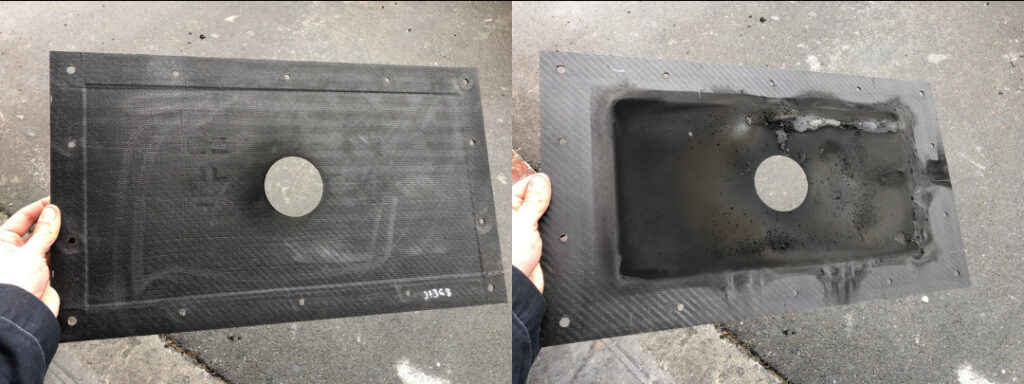PyroKarb, a carbon fiber-reinforced glass-ceramic, has been demonstrated to withstand the high temperatures of open flame during a thermal runaway event in eVTOL batteries with little to no damage.
Pyromeral Systems (Barbery, France) specializes in the development and manufacture of heat-resistant mineral composites. PyroKarb, Pyromeral’s class of carbon fiber-reinforced glass-ceramic composite materials, for example, are well suited for the production of lightweight parts that operate at low temperatures in normal conditions, but require resistance to flames at very high temperatures, a situation most commonly experienced by thermal runaway in battery enclosures, or from burning kerosene.
Unlike carbon fiber-reinforced polymers (CFRP), PyroKarb composites are reported to be completely incombustible with a low density of 1.65 kg/dm3. Pyromeral says they do no release any smoke or harmful gases when exposed to elevated temperatures and successfully comply with the most stringent fire safety requirements.
Pyromeral has proven these characteristics through several tests. In one demonstration PyroKarb composite with a minimum thickness of 0.6 millimeter was exposed to a kerosene flame (1,070-1,100°C) for 15 minutes without the flame traveling, nor was there fumes or smoke (see the kerosene flame test here). Pyromeral noted loss of some of the material’s mechanical properties — specifically, its tensile strength dropped from 250 MPa to 40 MPa — but the material was virtually untouched.
In recent years, Pyromeral has tested its material against electric vertical takeoff and landing (eVTOL) aircraft battery casings as a potential fire protection solution and as an additional opportunity to save weight on the aircraft — typically, eVTOL batteries weigh more than one ton. As PyroKarb materials resist well against FAA-AC 20-135 tests, it made sense to contribute it to the protection of eVTOL vehicles and its passengers in case of thermal runaway.
CREPIM Laboratory (Bruay-la-Buissière, France) was consulted to lead Pyromeral’s battery ignition resistance tests to demonstrate’s PyroKarb’s capacity for eVTOL applications. Tests have been performed on a thin PyroKarb cover (0.9 millimeter thick) on a metallic rack using eight connected lithium-ion battery cells, each with 185 watt-hours of power and 51 amp-hours of capacity. Thermal runaway was generated using a 600-watt heating pad, which heated the cover to 925°C. An aperture was made in the center of the PyroKarb plate to enable fume and particle evacuation.
At the test’s conclusion, the PyroKarb cover did not show any wear or damage. Only surface pollution was visible. Mechanical tests were performed on both control samples and heat-affected areas. The company reported no impact on mechanical properties after the fire test (tensile modulus of 75 GPa and tensile resistance comprised between 195-220 MPa). Thus, the demonstration proved to Pyromeral the composite material’s capacity to survive well during a thermal runaway event, meaning it could be considered as a structural material for battery casing.
What’s next for the company? “Pyromeral plans to increase material quantities per the demand of end-use partners, while implementing two new prepreg production lines, the first one being installed in its European factory (in France), and the second one being in a new production facility in the U.S. (California),” Dr. Ing. Guillaume Jandin, sales and marketing director, Pyromeral, says. “The U.S. facility will also incorporate a design office and composite component production capacities. Both lines will be in operation before the end of this year. They could each produce approximately ~50,000 square meters (>500,000 square feet) of prepreg per year. A third machine will be prepared to enter production in 2025.”
Credit: CompositesWorld

